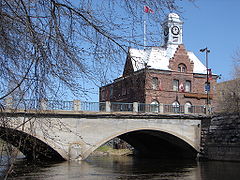Total lawlessness, violence and a lot of liquor consumption. Hard to think about Pembroke in those terms, but according to local historian Bruce Pappin, that’s exactly what it was like to be a Pembrokian during its “wild west” settlement period in the early 1800’s. Of course it wasn’t known as Pembroke then–that came later, when in the mid 1800’s , the area grew from a community of log shanties to a modern Victorian town built with a lumber baron’s money.
Over the past two centuries, Pembroke has evolved to become a small rural city, but it is its founding years that provide the most interesting stories. Those tales will come to life through the words of Pappin, who has been studying Pembroke’s past for almost 40 years, and will teach a “History of Pembroke” series, as part of our new Speakers Series at the Waterfront Campus.
The series is broken into four segments, starting with a History of Pembroke’s Churches and Patterns of Destruction–chronicling the impact of Pembroke’s great fires and how they changed the face of the community. Both of these classes will be offered in the spring. In the fall, Pappin will focus on the Wild West years in the mid-19th century and what he calls “Pembroke’s Golden Years,” from 1861 to the end of the First World War in 1918.
 Pembroke’s Grand Trunk Railway Station was always a hub of activity. It was both a passenger and service
Pembroke’s Grand Trunk Railway Station was always a hub of activity. It was both a passenger and service
link for the community and was located near Pembroke City Hall.
The classes are sure to provide history buffs with a lot of great information and were sparked by a Facebook page that captures the imagination of anyone who is interested in Pembroke’s past. The site, known as “I’m from Pembroke, Ontario and I’m Not Afraid to Admit It,” now has almost 3,000 likes.
What makes the site authentic is its participation by people of all ages and the sharing of photographs that capture Pembroke’s early years. The dialogue is rich and quite often articles are posted that catch people off guard, like the one by local historian Jackie Patterson, who questioned whether Peter White was in fact, the Founder of Pembroke.
For the record, White still has the Founder title, as noted in the City’s official history on its website.
 Pembroke City Hall. It was originally the City’s Post Office.
Pembroke City Hall. It was originally the City’s Post Office.
When people talk about Pembroke being a logging town, there is so much more to the story. Yes, it was trees that brought the early settlers here, but to really appreciate its history, you have to dig deeper, as Pappin has done. His research should be celebrated and shared. It’s why Algonquin College is so pleased to present his “History of Pembroke” series. Take advantage of this opportunity to learn more about Pembroke.
Posted by: Jamie Bramburger